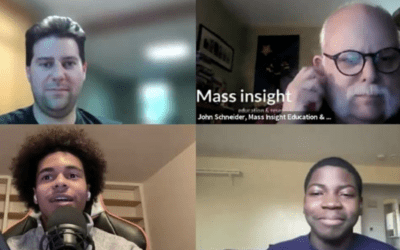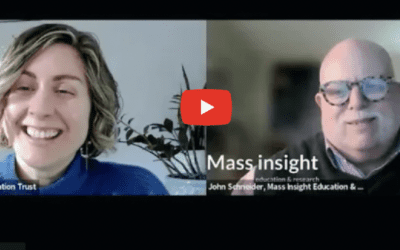The Boulder Fund grant will allow Mass Insight to pilot a new program targeting middle school readiness. May. 22, 2025 –Boston– Mass Insight Education & Research’s President and CEO, Andrea Wolfe, has been selected in the 2025 cohort of Education Leaders of...
The Humanities and STEM
In a recent New York Times editorial, David Brooks asserts that despite the current need for science and technology, “the humanities are in crisis at the exact moment history is revealing how vital moral formation really is.” He suggests that while science is “producing the vaccines, the humanities [are] stocking leaders and citizens with capacities of resilience, care and collaboration until they come.”
This got me thinking of why Mass Insight’s AP program includes English in what is otherwise a STEM-focused initiative. When I joined Mi as the English Content Director, I understood that college literacy skills would help students succeed in their STEM courses. What matters more, however, is that how we express our understanding of people and problems is relevant in both the literary and technological world.
In teaching rhetoric, we focus on the exigence of a situation in the process of analysis. We need to know the back story before we can dive into the what and so what of an argument or situation. So it is in science. AP science and math students are asked open-ended questions to explain their process of problem solving. Students are asked to demonstrate their mastery of complex topics not only by knowing the steps but by explaining the back story.
Whether they get the “right” answer is not always as valuable as the steps they take to get there. The process reflects their ability both to think critically and to risk delving into the complexity of a problem whether it be to determine a character’s motivation or to find the derivative of a mathematical function.
Studying the humanities allows us to learn from the past, to listen closely and to debate, to express ourselves clearly, to empathize and appreciate the back story so that we can move forward. By including AP English in our STEM focused work, we help our future scientists also become the citizens and leaders so needed in the world today.

Recent Posts
Cybersecurity Event Introduces Students to Cyber Careers
For the 5th year in a row, Mass Insight Education & Research is hosting the Cybersecurity and You Workshop to introduce Advanced Placement® (AP) STEM high school students to cybersecurity scenarios and concepts as well as postsecondary education and career paths....
Adolescent Literacy Crisis: IES Guide In Action – Webinar
What does the evidence say about how schools can improve the adolescent literacy crisis happening in our country? In this webinar, we explore the Institute of Education Sciences Reading Intervention Guide for Grades 4 through 9, found here, and diving into two of the...
You may also like
An Interview with Mass Insight AP Students and their Teacher
https://youtu.be/mQTeW8-sX40 We sat down with two Mass Insight AP STEM & English Program students, Ben and Chris-Ander, and their teacher, William Pellegrino, to hear about their educational journeys, their experiences in AP classes and as vocational students, and...
An Interview with Kristen Hengtgen of The Education Trust
https://youtu.be/1ZfxNShHJOU?si=d1a1GoVrgrDWT5Cu Kristen Hengtgen, Ph.D. is a senior analyst on The Education Trust's P-12 policy team and co-author of their new report, Increasing Access to Advanced Coursework in Massachusetts. In this interview, she joins Mass...
Creating the conditions for greater success of systemically disadvantaged students in AP: Next steps for the Massachusetts AP STEM & English program
Recently the New York Times published an article entitled, Why is the College Board Pushing to Expand Advanced Placement? The article focuses on an important issue: there’s been greater growth in AP participation for Black and Latino students and students living in...



